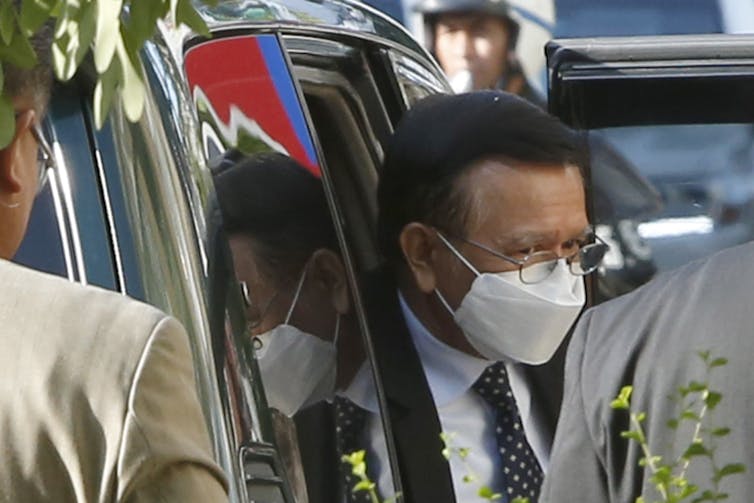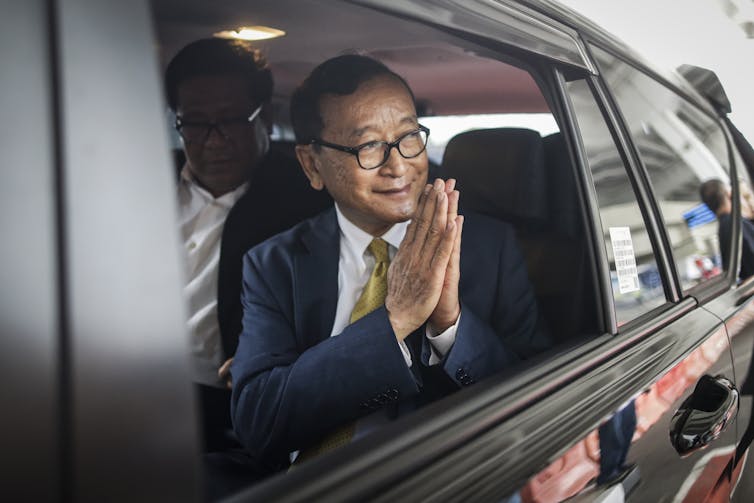Calling for a special UN Security Council session to be convened in light of the Kingdom's deteriorating human-civil rights situation and the denial of democratic space would be the least any UN envoy or representative could do. For some reasons, this has not been the case and the usual rhetoric and periodic reports on the usual crises have been pretty much the order of the day and sum total in the UN's focus and effort for the country.
On the other hand, it appears that every time anyone is arrested and bundled off into prison, this is a consequence of opposition leaders' ‘inflammatory rhetoric’ and 'agitation' or 'incitement' while living in their security of a "self-imposed" overseas exile? Oh, by the way did the dictator himself once or twice threaten to close down the UN office in Cambodia?
It is not only the Cambodian opposition - now politically dissolved and banned from politics - that has 'failed' the Cambodian people in this regard. The various governments making up the principal signatories to the Paris Peace Accords along with the UN have hardly lived up to their own rhetoric or pledge to bring hope via multi-party democracy to the country. Indeed, these players' empty rhetoric and lack of political will to see through the implementations - or lack thereof - of the Accords' stipulates are what embolden the regime to deviate from the constitutional democratic path and towards this single-party autocracy in the first place.
Had not the now dissolved opposition party been one direct principal outcome of the 1992 Paris Peace Accords itself?

Author: Rhona Smith
Professor of International Human Rights, Newcastle Law School, Newcastle University
Disclosure statement
Rhona Smith is currently the independent UN Special Rapporteur on the situation of human rights in Cambodia. This article is written in her private, academic capacity and does not necessarily reflect views of the United Nations. She declined to provide a profile picture.
Stable or not, more than 100 people were summoned to attend Phnom Penh Municipal Court on Thursday November 26 2020 on charges including violence endangering Cambodian institutions (Article 451 Criminal Code), conspiracy (Article 453) and incitement to commit a felony (Article 495). The cases were immediately adjourned until 2021.
This marks the latest event following a series of arrests over the past 18 months of people affiliated with the former Cambodia National Rescue Party (CNRP), raising alarm among civil society organisations including ASEAN Parliamentarians for Human Rights, national organisations, Forum Asia and Human Rights Watch.
Some background is necessary to understand these events, both in terms of the current politics of Cambodia and in terms of the fractured relationship between two of the main players: the country’s prime minister, Samdech Techo Hun Sen, and his long-time antagonist, Sam Rainsy – interim leader of the CNRP.
Current political situation
Cambodia has a bicameral system, with its members of parliament elected to the National Assembly and an upper Senate comprising senators elected primarily by local councillors. Cambodia’s previous local elections in June 2017 brought victory for the ruling Cambodian People’s Party (CPP) but increased gains for the CNRP. The subsequent general election in July 2018 resulted in what is effectively a one-party state, as foreseen.Following the decision of the Supreme Court to legally dissolve the CNRP, the CPP – led by Hun Sen – won all 125 seats in the 2018 National Assembly election and the 58 seats of the 62-member Senate that are indirectly elected.
Kem Sokha, former president of the CNRP, was arrested and detained in September 2017 (after the successful local elections) on charges of treason and conspiracy with foreign states, notably the USA. His trial commenced in January 2020 and was greeted with concern by national civil society groups and UN special procedure mandate holders. Proceedings were suspended indefinitely in March due to the COVID-19 pandemic.

But history is somewhat more complex – many of those summoned this week were linked to Sam Rainsy, CNRP president, currently in self-imposed exile. Both he and Hun Sen regularly engage in verbal spats, often deploying personal, highly inflammatory rhetoric which, as UN special rapporteur, I have regularly condemned. To understand their fractured and fractious relationship, a little history will help.
Sam Rainsy and Hun Sen
Sam Rainsy has been in or on the periphery of politics in Cambodia for most of the modern period. He was first elected as a member of the royalist FUNCINPEC party at the UN-administered elections in 1993. He served as minister of economy and finance before his expulsion a year later. He then founded the Khmer Nation Party – subsequently renamed Sam Rainsy Party – and was reelected in the 1998 and 2003 general elections with his party gaining seats.In 2005, in the wake of a number of (criminal) defamation charges lodged against him, Rainsy had his parliamentary immunity revoked and he fled. He was tried in absentia, convicted and, following a royal pardon at the request of Hun Sen, he returned to Cambodia in 2006, standing in the 2008 general elections.

Self-imposed exile: Cambodian opposition figurehead, Sam Rainsy. EPA-EFE/ Mast Irham
At the same time around 70 former Cambodia National Rescue Party associates and members, considered supporters of Sam Rainsy, who had been arrested, were released from detention and Kem Sokha was released from house arrest. Sam Rainsy remains overseas.
To the future
It is now two and a half years until the next scheduled general election and less than 18 months before local elections. Commentators such as Sebastian Strangio and David Hutt highlight the continuing crackdown on political opposition while also probing for signs of political weakness in advance of the next elections. It’s an “all time low” for democracy, as the director of the Cambodian Centre for Human Roghts, Chak Sopheap has noted. Indeed it was recently reported that Hun had said there could be no compromise or rapprochement.The trials are the latest in a long line of proceedings against opposition political actors in Cambodia. Laws on plotting, incitement and defamation are regularly invoked to arrest and detain individuals. Often, individuals are then released from detention under judicial supervision, so neither detained nor charged. Under Cambodian law, release under judicial supervision can be indefinite with charges resurrected years later, contrary to international human rights.
The future for Cambodia’s constitutionally enshrined liberal multiparty democracy is not positive.

2 comments:
They are probably waiting for the check to clear before they act. It is what they are doing. Pretending to care but just want funding. At the end of the day, just lip service and worrying about the money. The UN is a joke. Cambodia is pretty much lost. Even Khmers living in the West don't seem to care about Cambodia. Very little to nothing from them. No support. Time to flee to the West.
This idiot Hun Sen can hold on to power a long time because he was never afraid to inflict Khmer people and Cambodia to please the evil Yuon who put him in power.
Post a Comment